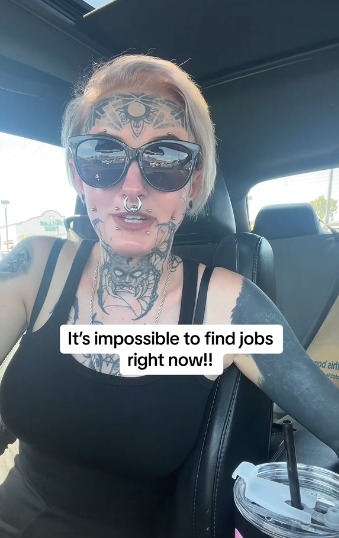Ash Putnam, a 23-year-old from California, recently shared her frustration on TikTok after being turned down for a job at TJ Maxx. Her video struck a chord online, racking up over 7 million views and tens of thousands of comments, with viewers quickly rallying around a shared sentiment about hiring practices and workplace bias.

In her TikTok, Putnam described how she had applied for an entry-level job at TJ Maxx, only to receive an automated rejection email “a few weeks” later.
“They couldn’t even call me; they just sent me some automated email,” she vented, expressing her disappointment at the impersonal response.
Unhappy with the vague email, Putnam decided to go to the TJ Maxx store to ask for a clear reason for her rejection. “I went in today and was like, ‘So what was the reason why I didn’t get hired?’” she recounted. According to Putnam, the response was that other candidates had more experience than she did.
She then inquired if her tattoos had played a role in the decision, noting that she’s aware of some workplaces being hesitant to hire people with visible tattoos. “I asked her if it was about my tattoos obviously because I know a lot of places don’t like tattoos. She said that wasn’t the reason. I don’t feel like that’s true, but whatever—I’ll leave it at that.”
The experience left Putnam feeling confused and frustrated. “Just because I have tattoos does not imply I won’t be a good employee. That makes no sense to me. Some of the most educated people I’ve ever met have tattoos and piercings,” she said in the video.
While TJ Maxx never provided a direct answer about whether her tattoos affected her application, TikTok commenters were quick to weigh in with their own interpretations. Many believed her tattoos likely influenced the decision, even if it wasn’t explicitly stated.
“Tattooer here, it’s probably the tattoos,” one commenter noted.
“HR supervisor here. There is no way any company would put you in front of customers like TJ Maxx,” another user shared, echoing the sentiment that visible tattoos could be viewed as a drawback in certain retail environments.
@ashxobrien I want to know who is also having a hard time finding a job right now! #jobs #jobmarket ♬ original sound – Ash🖤
One former TJ Maxx employee even chimed in, saying, “I worked at TJ Maxx, and they will hire just about anyone that comes off the street. It’s definitely the tattoos and piercings.”
Another comment suggested it may not just be the tattoos themselves but their specific placement: “I don’t think it’s because you have tattoos… I think it’s WHERE you have tattoos 🤷🏾♂️.”
In an interview with the Daily Star, Putnam admitted that she suspects her tattoos did play a part in her rejection. “I absolutely do think it’s about my tattoos because apparently my tattoos are demonic and scary to a lot of people,” she said. However, she noted that TJ Maxx never explicitly cited this as the reason, and she based her assumptions on feedback she’d received online.
In her TikTok comments, many viewers were less than sympathetic, with some even suggesting she find work in “a circus or a Halloween store” due to her tattoos. These comments didn’t sit well with Putnam, who found them to be judgmental and dismissive of her abilities as a worker. Despite the negative reactions, she stood firm in her belief that body art should not be a barrier to employment.
Even if her tattoos did influence TJ Maxx’s hiring decision, Putnam feels that companies need to rethink their approach to visible body art and other forms of personal expression. “People are being incredibly rude on my TikTok,” she said, describing some of the harsh feedback she’s received. But, despite the negative commentary, she believes that businesses should consider more inclusive hiring practices and move away from outdated biases.
This debate over tattoos and workplace professionalism isn’t new, yet Putnam’s viral video has rekindled it, shedding light on the experience of many young people with tattoos who face discrimination in their job search. For years, visible tattoos were largely viewed as “unprofessional” in traditional workplaces, particularly in customer-facing roles. However, as tattoos have become more mainstream, many have questioned why this stigma remains.
Putnam’s experience has sparked a broader conversation on TikTok and beyond, with many users sharing their own stories of being judged for tattoos or piercings in the workplace. Others voiced their frustration that something as personal as body art could affect someone’s employability in 2024.
“Tattoos don’t affect your work ethic,” one user commented. “I’m covered in tattoos and have been in customer service for years. It’s all about how you treat people.”
Still, some pointed out that certain companies have brand images to uphold, which may influence their hiring decisions. “Companies want to project a certain image, and tattoos don’t always fit,” said one user. “I think it depends on the workplace and the kind of clientele they serve.”
As the conversation continued, many others pointed out that standards for professionalism have shifted in recent years. With more young people entering the workforce, employers are being challenged to rethink old-school hiring criteria. Despite these changes, stories like Putnam’s show that biases still exist.
Putnam hopes her experience with TJ Maxx encourages more open dialogue about body art and workplace acceptance. “Businesses need to realize that tattoos don’t impact a person’s abilities or work ethic,” she said. “If anything, they’re just an expression of individuality.”
In a world where tattoos have become an everyday form of self-expression, it’s clear that these biases are becoming increasingly outdated. Whether her tattoos played a role in the decision or not, Putnam’s viral video has sparked a movement to normalize body art in professional settings. Her story serves as a reminder that as workplaces evolve, so should their standards—embracing diversity, self-expression, and individuality as valuable assets rather than drawbacks.





